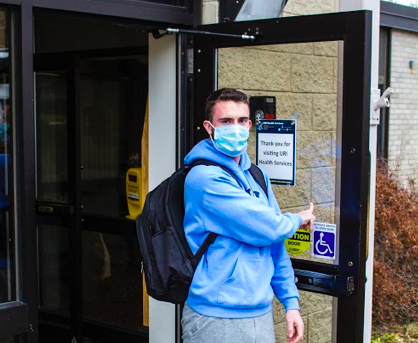Coronavirus outbreak makes travel unsafe
Due to growing concerns over the coronavirus, many students have taken advantage of the free antiviral masks offered by Health Services. Photo by James McIntosh.
The University of Rhode Island has suspended study abroad programs in China in response to the recent coronavirus outbreak.
URI has been working to facilitate the return of the seven students and one faculty member who were in China when the outbreak first began. Five of the seven students were from the Chinese Language Flagship Program and the other two were from the International Engineering Program (IEP).
Wayne Wenchao He Ph.D., a professor of Chinese and director of the Chinese Language Flagship program, was on the team that URI set up to coordinate the safe return and academic plans for students studying abroad in China at the time of the outbreak. According to He, the team included officials from the Provost’s office, risk management, health services, public safety, emergency management, communications and “all offices related” to the situation.
As of Jan. 29, all of the students had flights booked to return to the United States after being contacted by the team, who had made the decision on Jan. 28 to suspend all study abroad programs to China. The University reimbursed the students for their flights.
He said that all of the students will fly directly to their homes. Students’ families will pick them up at the airport, after which the students will stay in their homes for two weeks, which is the incubation time of the virus. After that, they will return to the University.
“The Provost’s office notified all of the related deans to make academic plans for all the students for the spring,” He said.
The Flagship program is proficiency-based and students must take a test showing that they have achieved Superior language proficiency at the end of the program. It is part of the nationwide Language Flagship program and receives funding from the National Security Education Program. On the same day that the URI team decided to suspend study abroad programs in China, the national Flagship program did the same.
On March 1, the national Flagship program will make a decision as to whether or not the current capstone students will be able to return to China this spring, as well as whether or not the students slated to start their capstone year in the spring will be able to start on time. If the current capstone students are unable to return for the spring, they will be able to take the final proficiency test in the U.S. In this case, the students set to start in the spring will be able to defer to the fall.
Sigrid Berka, Ph.D., the Executive Director of the International Engineering Program, said that the IEP students who were studying in China had safely returned to the U.S. as of Feb. 1. The students were studying in Hangzhou at Zhejiang University.
Students in the IEP program go abroad for one year. According to Berka, the students first study for a semester at Zhejiang University and then intern at one of the university’s research labs or at a company in the Hangzhou area. All three of the students had recently finished their exams and were able to receive those credits as normal. The students’ graduation dates will not be impacted by these changes to their study abroad programs, said Berka.
The IEP students will continue taking language courses and will also be continuing their research with professors here at URI through a collaboration with the university in China.
“It’s actually a nice opportunity that evolved,” said Berka, “[for] international collaboration that wasn’t there before.”
Ping Xu Ph.D., a professor in the political science department, and her family are also back in the United States as of Wednesday, Jan. 29.
Xu had been visiting family in Yichang, a few hours south of Wuhan, with her husband and two young children when the outbreak began. They were able to leave the country on Jan. 29 on a flight that the United States government had organized to exit diplomats and citizens from the area, according to Marc Hutchison, Ph.D., the chair of the political science department. Both Hutchison and the University were in contact with the office of Senator Jack Reed (D-RI) to help facilitate contact between Xu and the United States embassy.
Xu and her family are currently being monitored on an Air Force base in California, according to Hutchison, and will likely remain for over a week. He has been in contact with Xu and said that so far none of them are showing symptoms of the virus. She is teaching an online class this semester and has been teaching “as normal,” according to Hutchison.
The virus, which originated in the Chinese city of Wuhan, was first detected on Dec. 31, 2019. According to the World Health Organization, it has since spread to 23 other countries, including the United States, which as of Feb. 4 had reported 11 cases. So far, 20,630 cases have been reported worldwide, with the majority (20,471) in China. 424 of the 425 fatalities have occurred in China. Despite the rapidly increasing number of cases worldwide, though, the Centers for Disease Control and Prevention say that the risk to the general American public still remains low at this time.





